Top Trending Business News & Highlights
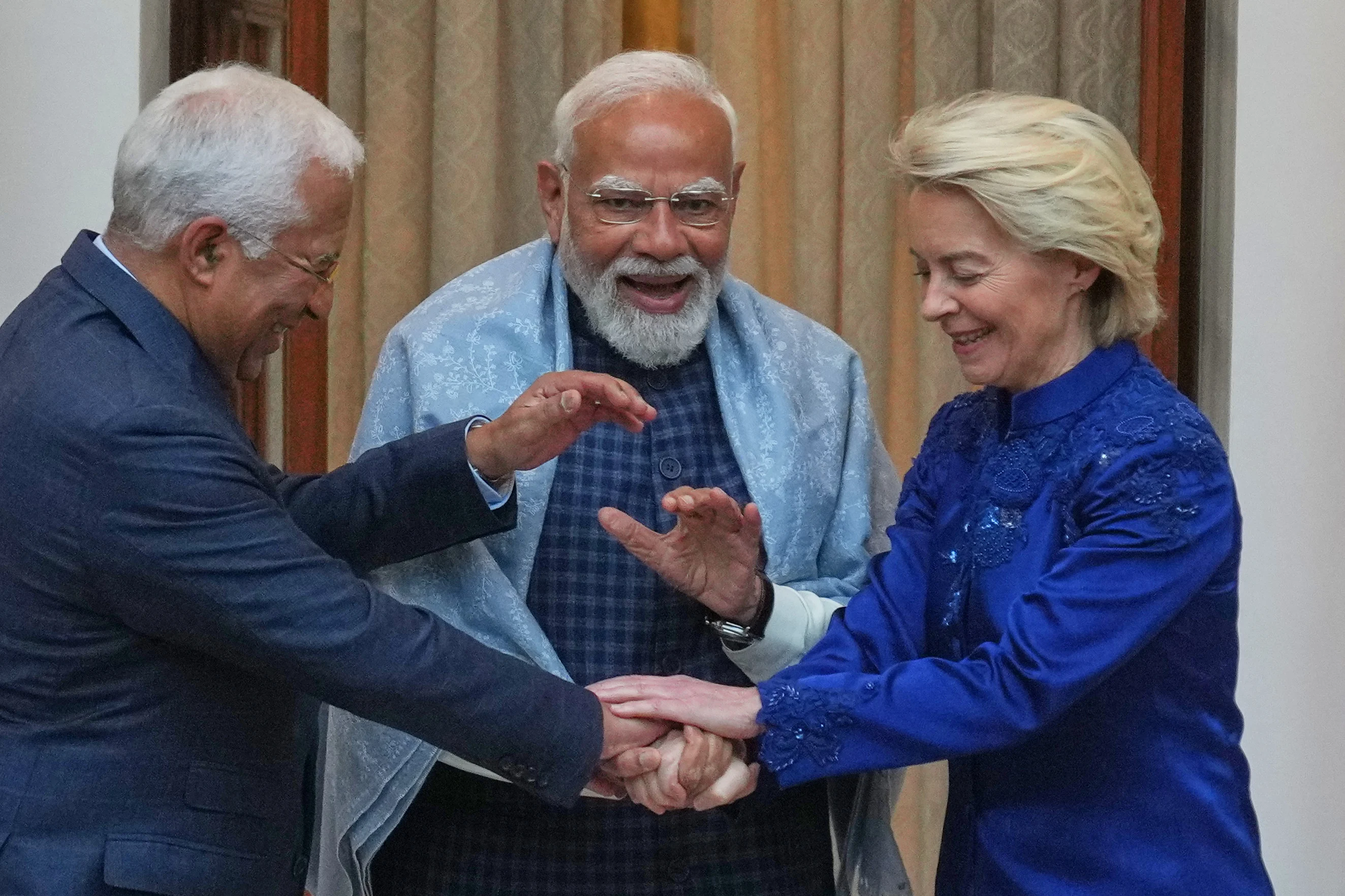

One accord, three setbacks India's use of the EU trade pact to boil Turkey, Pakistan, and Bangladesh
The United States has also been affected by India's trade agreement with the European Union. The historic trade deal between India and the EU would not only affect Bangladesh and Pakistan but also the United States and Turkey. The agreement calls for the elimination or reduction of tariffs on more than 90% of EU goods exports to India, including hefty charges of up to 44% on machinery, 22% on chemicals, and 11% on pharmaceuticals, which will be phased down over time.Following nearly two decades of negotiations, officials announced on Tuesday that India and the European Union have achieved a free trade agreement to strengthen economic and strategic ties. Up to 2 billion people might be impacted by the agreement, which the president of the EU's executive body referred to as the "mother of all deals." The accord won't go into force for some months. The agreement between two of the largest markets in the world comes as Washington imposes high import taxes on both the EU bloc and the Asian behemoth, upsetting long-standing trade patterns and forcing major economies to look for new alliances. The FTA, which both India and the 27-nation EU refer to as "the mother of all deals," provides a "decisive boost" to the labor-intensive textile industry by improving price competitiveness and expanding market access in one of the most sophisticated consumer markets in the world, according to a note released today by the Indian Textile Ministry.
Published 29 Jan 2026 12:51 PM
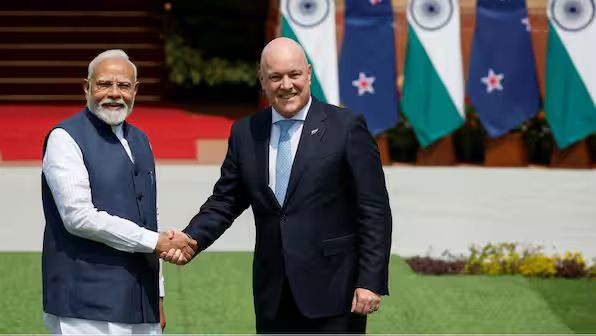

India and New Zealand wrap up free trade negotiations despite persistently high US tariffs
Free trade agreement (FTA) talks between India and New Zealand came to an end on Monday amid hefty US tariffs that have unsettled investors and led to the cancellation of orders from India's biggest export market. In the context of 50% US tariffs, the New Zealand agreement, if signed, would be India's second free trade agreement (FTA) following the Oman agreement. It would also be the country's third accord this year as it works to diversify its exports.According to information made public by the government, Wellington would remove tariffs on 100% of its tariff lines for all Indian exports, while India has committed to lower tariffs on 95% of New Zealand exports. However, New Zealand's typical tariffs are among the lowest in the world—between two and three percent—and their removal could not immediately boost exports. In order to bring some symmetry to the agreement, New Zealand has "committed" to investing $20 billion in India over the next fifteen years in exchange for market access in a rapidly expanding Indian consumer market that is subject to high tariffs (over 15%). Because of the unfair tariff rates, New Zealand may benefit more from goods trade than India.In 2024–2025, bilateral trade between India and New Zealand was only $1.3 billion. "This FTA opens doors for Indian businesses in the region through well-integrated directional exports and gives our youth choices to learn, work, and grow on a global stage," stated Commerce Minister Piyush Goyal."India's strengths are expanding exports, supporting labor-intensive growth, and power services," stated Commerce Secretary Rajesh Agrawal. New Zealand's access to India's sizable and expanding economy is deeper and more reliable. These qualities are brought together by the migration of individuals, professionals, students, and skilled workers. The FTA contains provisions to address non-tariff barriers through improved regulatory cooperation, transparency, and streamlined customs, sanitary and phyto-sanitary (SPS) measures, and technical barriers to trade disciplines, according to the Commerce and Industry Ministry, in addition to tariff liberalization. According to the Ministry, "all systemic facilitations and fast-track mechanisms for imports that serve as inputs for our manufactured exports ensure that tariff concessions translate into effective and meaningful market access."
Published 22 Dec 2025 10:28 PM


What workers, brokers, and policyholders stand to gain from travelers' agreement to preserve 1,400 jobs in Canada
The Canadian business of Travelers will be acquired by Definity Financial Corp. The total value of the acquisition is $3.3 billion. Definity will become the fourth-largest property and liability insurer in Canada as a result of this transaction. Every one of Travelers Canada's 1,400 employees will continue to work there. Consumers can anticipate competitive pricing and additional options. Regulatory permission is needed for the deal. By early 2026, it should be closed.Definity Financial Corp. plans to pay $3.3 billion to acquire the Canadian operations of the US behemoth Travelers, one of the largest transactions in Canada's insurance industry in recent memory. This merger could change the competitive environment for both insurers and consumers. More than 1,400 Traveler employees across Canada will retain their employment when the two companies combine under a single brand, despite the fact that large acquisitions frequently result in job losses.Definity will move up from sixth place to become Canada's fourth-largest property and liability insurer as a result of the purchase. Its expanding presence in the insurance industry is demonstrated by the $6 billion in total yearly premiums it currently manages.
Published 28 May 2025 07:58 PM
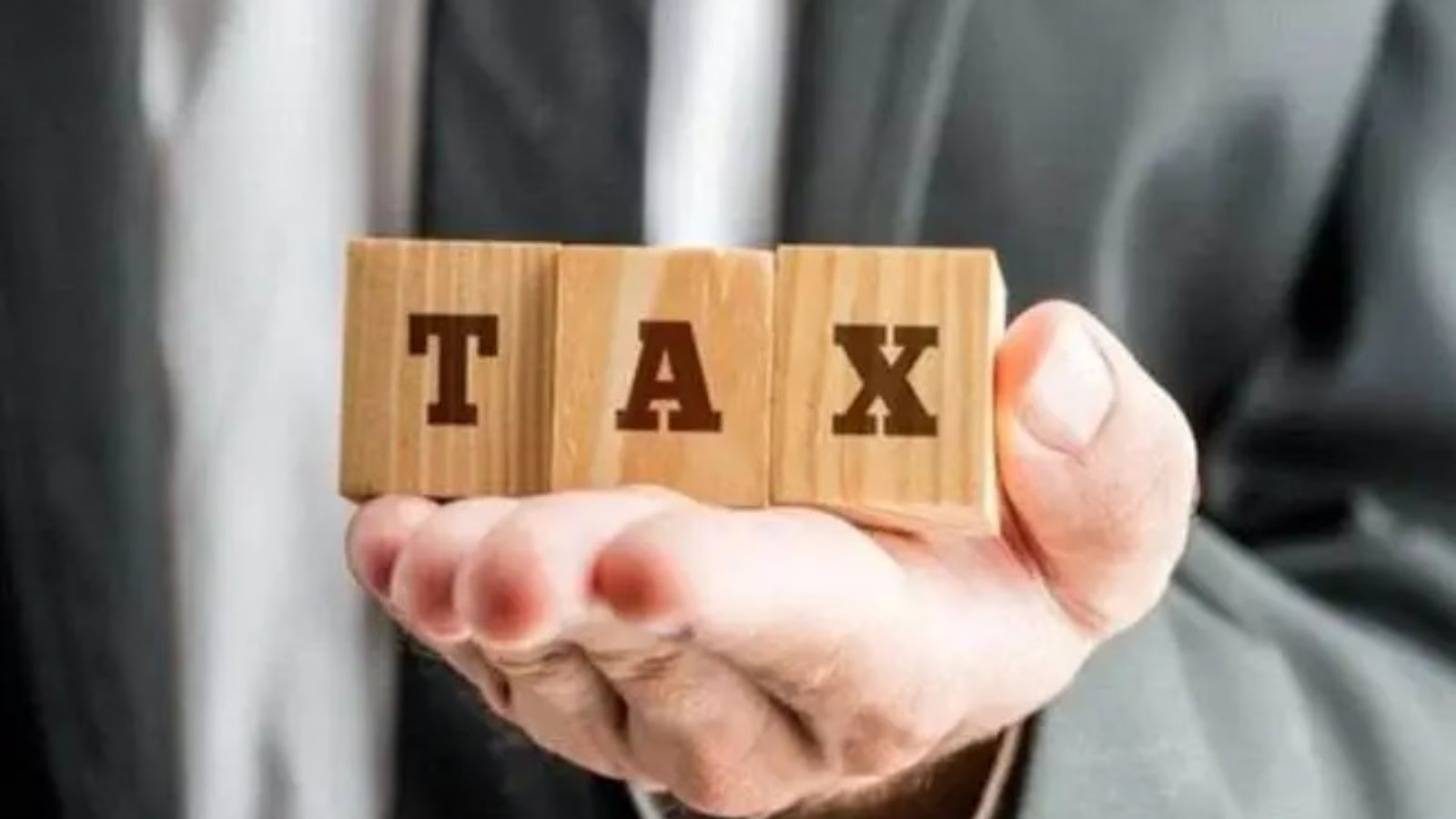

Why did India decide to remove the "Google tax" in response to pressure from the US?
The Center intends to eliminate the 6% equalization levy (EL) it levies on digital advertisements as part of the 35 modifications to the Finance Bill, 2025, effective April 1, 2025.The Central government has suggested to eliminate the equalization levy on internet advertisements as part of revisions to the Finance Bill, 2025, a move that is anticipated to help American large technology companies and allay US worries about India being a high tariff country.As part of changes to the Finance Bill, 2025, the central government has proposed doing away with the equalization levy on online ads. This is expected to benefit big IT companies in the US and ease concerns about India being a high-tariff nation.The equalization charge, also referred to as the Google tax, will be eliminated by the Center on April 1. The clause is one of 59 changes to the Finance Bill that Finance Minister Nirmala Sitharaman made on Monday and presented to Parliament.
Published 25 Mar 2025 08:42 PM


Business
Business globally are the pillars of any economy and they contribute in huge amount to take any country ahead financially and economically and boost the country grwoth.


MHA launches portal for those seeking Indian citizenship under CAA
The Ministry of Home Affairs on Tuesday launched a portal for people eligible to apply for Indian citizenship under the Citizenship (Amendment) Act 2019, an official spokesperson said.The move came a day after the government notified rules for implementation of the CAA 2019. "The Citizenship (Amendment) Rules, 2024 under the CAA-2019 have been notified. A new portal has been launched, persons eligible under CAA-2019 can apply for citizenship on this portal indiancitizenshiponline.nic.in," the spokesperson said. A mobile app 'CAA-2019' will also be launched shortly to facilitate applications through mobile app.The Centre on Monday implemented the Citizenship (Amendment) Act, 2019, notifying the rules four years after the law was passed by Parliament to fast-track citizenship for undocumented non-Muslim migrants from Pakistan, Bangladesh and Afghanistan who came to India before December 31, 2014.With the unveiling of the rules, the Modi government will now start granting Indian nationality to persecuted non-Muslim migrants -- Hindus, Sikhs, Jains, Buddhists, Parsis and Christians -- from the three countries. The rules comes into force with immediate effect.
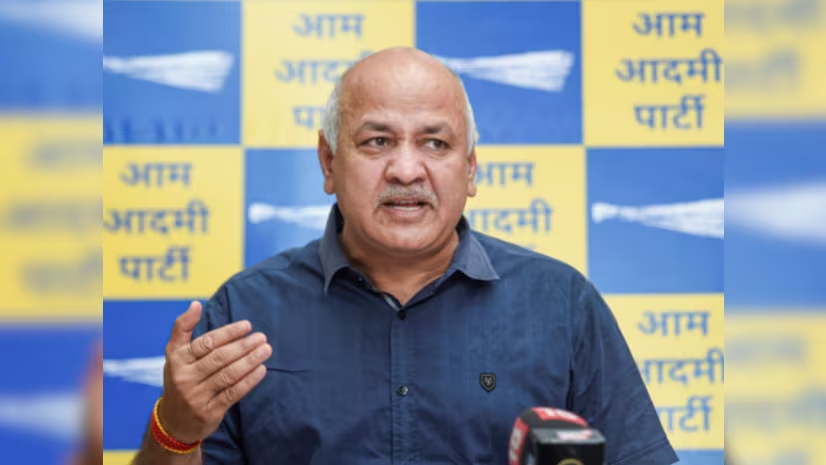

Delhi excise scam: Court extends Manish Sisodias judicial custody
A Delhi court on Tuesday extended the judicial custody of jailed AAP leader Manish Sisodia in a corruption case related to the alleged Delhi excise scam.Special Judge M K Nagpal extended the custody of Sisodia till March 22 after he was produced before the court on the expiry of his remand. The judge passed the order after the CBI counsel claimed that the investigation was at a crucial stage and if released on bail, Sisodia may hamper the ongoing probe or flee from justice. The judge also reserved the order on the application of the accused raising objections to the commencement of arguments on the framing of charges.The court is likely to pronounce the order on March 22. The CBI as well as the ED have alleged that irregularities were committed while modifying the Delhi Excise Policy 2020-21, undue favours were extended to licence holders, licence fee was waived or reduced and licences were extended without the competent authority's approval. The beneficiaries allegedly diverted "illegal" gains to the accused officials and made false entries in their books of account to evade detection. Sisodia was arrested by the Central Bureau of Investigation (CBI) on February 26, 2023, for his alleged role in the "scam". The Enforcement Directorate (ED) arrested Sisodia in a money-laundering case stemming from the CBI FIR on March 9, 2023 after questioning him in Tihar Jail. Sisodia resigned from the Delhi cabinet on February 28, 2023.


Auto retail sales jump 13%, PV sales scale record high in February
India’s automobile retail sales jumped 13 per cent in February to 2.03 million units, compared to 1.79 million units in February 2023, on the back of enhanced vehicle availability, improved demand due to economic conditions, and the impact of marriage season, according to Federation of Automobile Dealers Associations (FADA) data. However, the sector expects the upcoming Lok Sabha elections to play spoilsport in terms of sales due to potential deferred purchases across segments. Among all the categories, passenger vehicles (PVs) saw a record-breaking February, with sales moving up by 12 per cent to 330,107 units as compared to 293,803 units in February last year. Every other vehicle category, including two-wheelers, three-wheelers, tractors, and commercial vehicles, registered growth rates of 13 per cent, 24 per cent, 11 per cent, and 5 per cent, respectively."The PV segment recorded a 12 per cent YoY growth, marking the highest February sales figures ever, driven by new product introductions and enhanced vehicle availability. Elevated inventory levels in the PV segment, remaining at 50-55 days, pose a significant concern, necessitating original equipment manufacturers to adjust production to reduce dealer carrying costs,” said Manish Raj Singhania, president of FADA. On the other hand, the two-wheeler sector growth was mainly due to the rural sector, premium model demand, and strong entry-level segment performance, with broader product availability and compelling offers enhancing product acceptance. Factors like favourable marriage dates and improved economic conditions also contributed to this positive growth. During the month under review, two-wheeler sales were seen at 1.43 million, compared to 1.27 million during the same period last financial year. "The 3W market surged by 24 per cent, with EVs making up 53 per cent of this growth, fuelled by first-time users and a shift towards Electric E-Rickshaws, alongside better market sentiment and consumer engagement,” Singhania said. In February, three-wheeler sales touched 94,918 units, compared to 76,619 units in February 2023. The commercial vehicle segment grew by 5 per cent, overcoming challenges through fleet purchases and school buses, strong sectoral demand, and improved financing, despite obstacles like cash flow shortages and election-related purchase deferrals, highlighting the sector's resilience and gradual recovery. The segment saw sales of 88,367 units during the month, as against 84,337 units during the same period last year."The anticipation of elections casts a shadow over this positive scenario, with potential deferred purchases across segments. The commercial vehicle sector, in particular, might face a cautious approach from customers waiting for the outcome of general elections. Supply constraints further complicate the landscape, especially in the PV segment, where the availability of popular variants remains a concern. External factors like crop failures in rural areas could also dampen market sentiment and financial liquidity, posing additional hurdles to sustained growth,” Singhania added.


India Inc likely to see an average salary hike of 9.6% in 2024: EY report
In 2024, India Inc is likely to receive an average salary hike of 9.6 per cent, similar to that in 2023, a report released by EY said on Wednesday. It will, however, be lower than the 10.4 per cent seen in 2022. According to the "Future of Pay 2024" report, the highest salary hikes are expected to be seen in e-commerce (10.9 per cent), financial services (10.1 per cent) and professional services and real estate (10 per cent each). In 2023, the highest salary hikes were seen in e-commerce (10.5 per cent), auto/vehicle manufacturing and financial services (10.4 per cent each).The report highlighted that the fall in the quantum of salary hikes compared to 2022 is majorly due to the e-commerce sector and technology sub-sectors. "In 2022, certain technology sub-sectors, like cloud platforms and consumer technology, experienced notable growth," it said. "However, there is a projected decrease across all technology sub-sectors by 2024, potentially due to market saturation following rapid digital transformation in previous years." For e-commerce, it said that the fall may be attributed to "pandemic-driven shifts in consumer behaviour or intensified online competition".Variable pay percentage likely to fall In 2023, the average variable pay-out as a percentage of total fixed salary in India was 15.05 per cent. However, the report showed that the proportion of variable pay increases as the person goes up in the organisation. Last year, 9.2 per cent of the salary of individual contributors and 10.7 per cent of people managers were distributed as variable pay. For function heads and executives (CXOs), this was higher at 14.1 per cent and 26.2 per cent, respectively. In 2024, variable pay percentages are likely to decrease at all employee levels except the lowest-paid tier. The report added, "Executives typically get the most variable pay, but their projected salary increases for 2024 are lower than those in 2023."Attrition falls near pre-pandemic levelsThe EY report said that the attrition in India cooled down to near the pre-pandemic level of 18.3 per cent in 2023 from 21.2 per cent in 2022. Different surveys peg the attrition level in the pre-pandemic year in the range of 16-18 per cent. Out of 18.3 per cent, 15.2 per cent was voluntary attrition, and 4.2 per cent was involuntary.
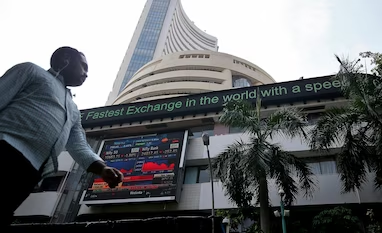

Stocks to watch: Tata Motors, M&M, IIFL Fin, NTPC, AU SFB, Godrej Agrovet
Over a flattish Monday, the Equity benchmark indices Sensex and Nifty are looking at a muted head start on Tuesday as well as investors will track weakening global markets. At 7:00 am, the Gift Nifty futures were down 11 points at 22,487.50 over Nifty futures’ last close. Investors today may pick on negative global cues in the Asian as well as in the US market. In Asia this morning, Nikkei slipped below the 40,000 mark that it hit on Monday, the index fell by 0.34 per cent, while the Topix dropped by 0.3 per cent. South Korea's Kospi fell by 0.26 per cent, and the small-cap Kosdaq dropped by 0.52 per cent. Hong Kong's Hang Seng index futures at 16,368 also indicate a weaker opening compared to the HSI's close at 16,595.97. In the US, the S&P 500 declined by 0.12 per cent, the Nasdaq Composite slipped by 0.41 per cent, and the Dow Jones Industrial Average lost 0.25 per cent.The Street will also see two new stock debuts. Exicom Tele Systems and Platinum Industries will get listed against their issue prices of Rs 142 and Rs 171, respectively.Tata Motors Ltd. IIFL Finance: The Reserve Bank of India (RBI) on Monday debarred IIFL Finance, a non-banking financial company (NBFC), from sanctioning and disbursing fresh gold loans following “material supervisory concerns” and to protect the interests of customers with immediate effect. Macrotech Developers: The company has initiated a qualified institutional placement (QIP) to raise Rs 3,300 crore. NTPC: NTPC Green Energy Limited has entered into a joint venture agreement with Uttar Pradesh Rajya Vidyut Utpadan Nigam Limited to collaboratively develop renewable power parks and projects in the state of Uttar Pradesh.AU Small Finance Bank: The Reserve Bank of India has approved the amalgamation of Fincare Small Finance Bank with Jaipur-based AU Small Finance Bank, effective from April 1, 2024, creating an entity with a balance sheet of over Rs 1.16 trillion. Godrej Agrovet: The promoters of Godrej Tyson Foods are in talks with potential investors, including private equity (PE) companies, to sell a minority stake in the company, according to a banking source close to the development. Biocon Biologics: Biocon Biologics, a subsidiary of Biocon, on Monday officially announced a settlement with Bayer and Regeneron Pharmaceuticals. This agreement allows Biocon Biologics to launch Yesafili, a proposed biosimilar to EYLEA (aflibercept) Injection, in the Canadian market.Cadila Pharma: Cadila Pharmaceuticals, on Monday announced the launch of a new influenza vaccine called Cadiflu Tetra. Jio Financial Services: Two promoters of Jio Financial Services Ltd. are set to acquire 14 crore shares of the subsidiary. Sikka Ports and Terminals Ltd. and Jamnagar Utilities and Power Pvt. will collectively acquire a 2.2% stake in Reliance Industries Holding Pvt.LTIMindtree: The company’s product division, Fosfor, has introduced the Fosfor Decision Cloud.NBCC: The company’s unit secured an order valued at Rs 92 crore from the Post Graduate Institute of Medical Education and Research in Chandigarh.


Stock Market Live Today: Closing Bell: Sensex, Nifty scale fresh record highs, rise for 4th day in a row
Benchmark equity indices Sensex and Nifty closed at new record levels on Monday in a highly volatile trade driven by gains in energy and bank shares and a rally in Asian markets.Extending its rally to the fourth straight session, the 30-share BSE Sensex climbed 66.14 points or 0.09 per cent to settle at an all-time high of 73,872.29. During the day, it jumped 183.98 points or 0.24 per cent to 73,990.13. The Nifty rose by 27.20 points or 0.12 per cent to close at a lifetime high of 22,405.60 points. During the day, it hit an all-time high level of 22,440.90.Among the Sensex firms, NTPC, Power Grid, Reliance Industries, Bajaj Finserv, Axis Bank, Tech Mahindra, ICICI Bank, Bharti Airtel and IndusInd Bank were the biggest gainers. JSW Steel, Mahindra & Mahindra, Tata Steel, UltraTech Cement, Infosys and Titan were among the laggards.In Asian markets, Seoul, Tokyo, Shanghai and Hong Kong settled in the green.European markets were trading on a mixed note. The US markets ended with gains on Friday. Global rating agency Moody’s on Monday raised India’s growth forecast for 2024 calendar year to 6.8 per cent, from 6.1 per cent estimated earlier, on the back of ‘stronger-than-expected’ economic data of 2023 and fading global economic headwinds. In a special trading session on Saturday, the BSE benchmark Sensex climbed 60.80 points or 0.08 per cent to reach its all-time closing high of 73,806.15. The Nifty went up by 39.65 points or 0.18 per cent to settle at a new closing high of 22,378.40. Leading stock exchanges BSE and NSE conducted a special trading session in the equity and equity derivative segments on Saturday to check their preparedness to handle major disruption or failure at the primary site. Global oil benchmark Brent crude climbed 0.30 per cent to USD 83.80 a barrel.Foreign institutional investors (FIIs) offloaded equities worth Rs 81.87 crore on Saturday, according to exchange data. - PTI


Highlights of the day: 400 farmer unions to be at Mahapanchayat in Delhi
The Samyukta Kisan Morcha (SKM), which spearheaded a farmers' agitation in 2020-21, said on Saturday that more than 400 farmer outfits will participate in a "Kisan Mahapanchayat" in Delhi on March 14 to press the BJP-led Centre to accept their demands, including a law on the minimum support price (MSP) for crops. US military planes airdrop about 38,000 meals into Gaza in first round of emergency humanitarian aid authorised by Biden, reports AP. Thirty-four Union ministers, two former ministers, Lok Sabha speaker figure in BJP's first list of 195 candidates for LS polls. Prime Minister Narendra Modi to fight Lok Sabha elections from Varanasi, says BJP.In first list, BJP announces candidates for 51 Lok Sabha seats in UP, 20 in West Bengal, five in Delhi, one each in Goa and Tripura. BJP repeats Kiren Rijiju, Tapir Gao from two Arunachal Pradesh seats for Lok Sabha polls.Twenty-eight women, 47 young leaders in BJP's first list of Lok Sabha candidates for 16 states and Union Territories.A ship earlier attacked by Yemen's Houthi rebels has sunk in the Red Sea after days of taking on water, officials say, reports AP. Google has initiated the process to restore Indian mobile apps which had been dropped from the Play Store over a dispute over service fees. The decision was taken after the company's officials held a meeting with IT Minister Ashwini Vaishnaw, sources said.On Friday, Google had removed apps belonging to 10 Indian companies, sparking controversy in one of its fastest-growing markets. Google dominates the Indian market as 94 per cent of phones are based on its Android platform. The list included well-known names such as Bharatmatrimony and Naukri. The dispute primarily revolves around Google's imposition of fees ranging from 11 per cent to 26 per cent on in-app payments. Indian startups have long protested against what they deem as unfair practices by the US tech giant.The BJP is expected to release a first list of candidates for the 2024 Lok Sabha elections this evening, sources said. The list that is said to be announced at a BJP press conference at 6 pm comes days after back-to-back late night meetings in Delhi. Earlier, the sources told NDTV that the BJP may announce more than 100 names that will include heavyweights such as Prime Minister Narendra Modi and Home Minister Amit Shah.Few investors 'stooped to heartless level', ensuring we are unable to utilise raised funds to pay salaries: Byju Raveendran to staff.


JSW Steel, Italy govt sign agreement to relaunch Piombino steel hub
JSW Steel Italy has signed a memorandum of understanding (MoU) with the Italian government to relaunch the steelworks site of Piombino with an investment of 143 million euros.In a statement, the company said that an MoU was signed with Italian authorities and its subsidiary, JSW Steel Italy SRL.Apart from doubling the current rail-making capacity from 300,000 tonnes to 600,000 tonnes per annum, the investments at Piombino are aimed at making the rail mill more efficient, the most modern, technologically advanced, and best in class, the company added. The Italian steel industry is undergoing a transformative stage, JSW Group Chairman, Sajjan Jindal said. “JSW Steel Italy’s investments to modernise the Piombino Steelworks site reiterates our commitment to partner with the Italian government’s effort in the growth and economic development of the region. The investments of 143 million euros in modernising the rail mill at Piombino will make the Piombino rail mill the most modern, technologically advanced and best in class rail mill in Europe.”“This project will safeguard the aspiration towards the development of Piombino as a steel hub and will step up domestic production which will result in a reduction of imports of steel products in Italy,” he added. The project envisages setting up a tandem mill, head hardening facility, and increasing the length of rails from 108 to 120 metres.The MoU sets the conditions for efficient and sustainable state support for the production of rails, the company said, adding that it was part of a broader project to kick-start the economic development of the region which also includes the restarting of the production of steel products to safeguard employment and reduce the import of steel products into Italy.v


Sebi moves to restrict inflows into small- and mid-cap mutual funds
India's market regulator has asked money managers to consider restricting one-off investments from clients in small- and mid-cap stock mutual funds and cut commissions offered for their sale, two sources with direct knowledge of the matter said.The Securities and Exchange Board of India (Sebi) communicated this to the money managers in a meeting earlier this month, the sources, who included a regulatory official, said. The regulator did not specify the quantum of flows it wants restricted, they said. Sebi's communication shows heightened regulatory concern on the surging inflows into Indian small- and mid-cap mutual funds and any potential ripple effects on the financial system if investors suddenly started to yank their money from them. In India, small-cap stocks are defined as those with market capitalisation of less than Rs 5,000 crore ($603.05 million) while mid-cap stocks are those with market values of between Rs 50 crore and Rs 20,000 crore. Small- and mid-cap stocks are generally less liquid compared to their large-cap peers. Assets managed by small-cap funds in India vaulted 86.5 per centover a 10-month period to Rs 2.48 trillion ($29.92 billion) as of end-January and mid-cap funds jumped 58.5 per centto Rs 2.9 trillion . Their assets were not much lower than the Rs 2.99 trillion managed by large cap funds. The Nifty small-cap 100 index has surged 74 per centover the past 52 weeks and the Nifty mid-cap 100 index is up 60.86%, as of Wednesday's close. Those gains far exceed the benchmark Nifty's 26.21 per centrise over the same period. "A nudge to institutional investors such as mutual funds will help soothe extraordinary exuberance building up particularly in small and mid-cap stocks," the regulatory official said. Sebi did not respond to an emailed request for comment. The market regulator's communication to money managers about one-off investments is not an official order. The industry has in the past almost always complied with messages from Sebi. India's mutual fund assets have grown significantly over the years as investors have bought systematic investment plans that make regular contributions towards their portfolios. But domestic investors are also increasingly pumping in one-off, or lumpsum, funds to take advantage of the soaring stock market.


Reliance, Disney sign $8.5 bn deal to form JV, to merge media ops in India
India's top conglomerate Reliance Industries and Walt Disney on Wednesday announced the merger of their India TV and streaming media assets, creating an $8.5 billion entertainment juggernaut far ahead of rivals in the world's most populous nation. Reliance, led by Asia's richest man Mukesh Ambani, will inject $1.4 billion in the merged entity, with the company and its affiliates holding a more than 63% stake. Disney will hold about 37%, the companies said in a joint statement. For Disney, the merger follows its long-drawn struggle to arrest a user exodus from its bleeding India streaming business and financial strain caused by billions of dollars in Indian cricket rights payments, in another example how foreign businesses can struggle to grow in India. The merger values the India business of the US entertainment giant at just around a quarter of the $15 billion valuation when Disney acquired it as part of its Fox deal in 2019, sources have said.The companies said the transaction values the merged venture at around $8.5 billion on a post-money basis. They did not explain how they arrived at such valuation. Together, the Reliance-Disney merged entity will have 120 TV channels and two streaming platforms, helping Ambani eclipse rivals such as Japan's Sony, India's Zee Entertainment and Netflix in the country's $28 billion media and entertainment sector. Reliance said Nita Ambani, wife of Reliance boss Mukesh Ambani, would chair the board of the combined entity, and former top Disney executive Uday Shankar would serve as vice chair. "The JV will be one of the leading TV and digital streaming platforms for entertainment and sports content in India, bringing together iconic media assets across entertainment," the companies said in a joint statement. The deal comes when Disney is facing pressure globally to streamline its businesses. Bob Iger returned as Disney chief executive in November 2022, less than a year after he retired, and has since restructured the company to make the business more cost effective. Still, Disney is up against activist billionaire investor Nelson Peltz who is pushing the home of Mickey Mouse to cut costs, create a profitable streaming business globally, improve the performance of its movie studio, and clean up its succession planning. Iger in November said the company would like to stay in India, but it was considering its options. "Reliance has a deep understanding of the Indian market and consumer," Iger said in the statement on Wednesday, adding the deal will allow "us to better serve consumers with a broad portfolio of digital services and entertainment and sports."


Microsoft Unveils Copilot for Finance, an AI Solution to Simplify Tasks Associated with Enterprise Finance
Microsoft on Thursday unveiled Copilot for Finance, a new artificial intelligence (AI) tool designed to make everyday mundane tasks easier for financial professionals. The Copilot tool adds new features tailored to financial operations to the already-existing Copilot for Microsoft 365 stack, rather than creating a brand-new AI model. This AI tool, which focuses on enterprises, is currently in public preview. Notably, a recent update from the tech giant revealed additional features and significant enhancements for Windows 11.Microsoft presented its new AI tool in a blog post, pitching it as a means of allowing finance departments within businesses to focus on strategic tasks rather than tedious analysis and report writing. The business also cited a statistic from CFO magazine, stating that the "drudgery of data entry and review cycles" was cited by 62% of finance professionals polled as a reason they could not find time for strategic tasks. The tech giant claims that Copilot for Finance automates a number of financial tasks that would otherwise require users to put in long hours. It can accomplish a wide range of tasks, including using natural language prompts to conduct a variance analysis in Excel, reconciling data in Excel with automated data structure comparisons, giving a comprehensive summary of pertinent customer account details, transforming raw data into visuals and reports, and much more.
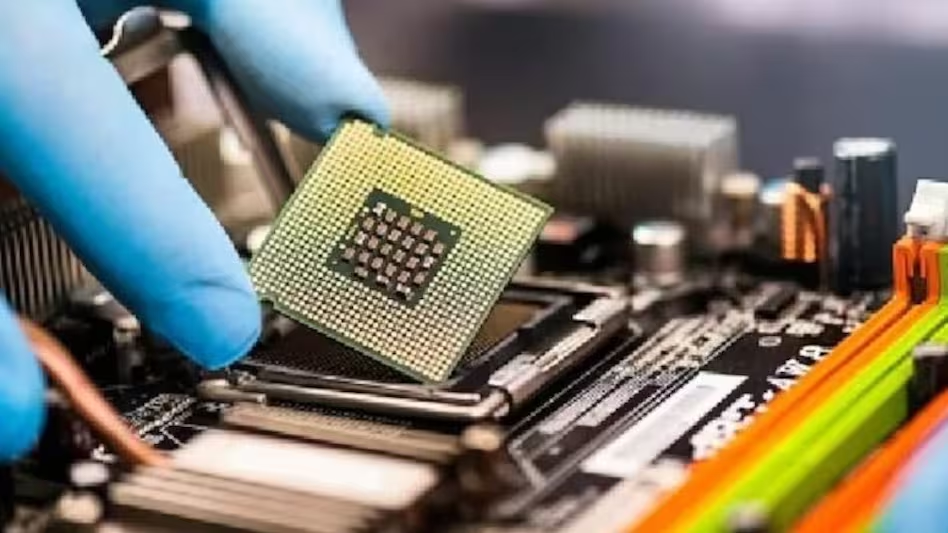

India’s emergence as chip manufacturing hub no longer a distant dream, say experts
Marking a big milestone in India’s decades-old dream of becoming a semiconductor nation, the Centre has approved the proposal for India’s first commercial chip fabrication plant. The development comes two years, two months and 14 days after the government introduced the programme for the Development of Semiconductors and Display Manufacturing Ecosystem in India with a total outlay of Rs. 76,000 crores. Industry hails the development stating this is just the beginning with many more approvals to follow.Of the three proposals approved, the first is of Tata Electronics Private Limited, which will set up a semiconductor fab in partnership with Taiwan’s Powerchip Semiconductor Manufacturing Corp (PSMC) in Gujarat’s Dholera. Investment in this fab will be Rs 91,000 crore. The fabs capacity is pegged at 50,000 wafer starts per month (WSPM). The second proposal approved is also of Tata Group but for Assembly and testing. Tata Semiconductor Assembly and Test Pvt Ltd (“TSAT”) will set up a semiconductor unit in Morigaon, Assam with an investment of Rs.27,000 crore. For this, TSAT semiconductor is developing indigenous advanced semiconductor packaging technologies including flip chip and ISIP (integrated system in package) technologies. With the capacity of testing and packaging 48 million per day, the plant will cover automotive, electric vehicles, consumer electronics, telecom, mobile phones and other segments. The third proposal approved was CG Power’s OSAT in partnership with Renesas Electronics Corporation, Japan and Stars Microelectronics, Thailand. This plant will be setup in Sanand, Gujarat with an investment of Rs 7,600 crore. The CG power semiconductor unit will manufacture chips for consumer, industrial, automotive and power applications and will have a capacity of 15 million per day. Pankaj Mohindroo, Chairman of ICEA says, “The emergence of Bharat as a global semiconductor manufacturing destination no longer seems to be a distant dream. By 2027 we will have the FAB and OSAT units producing. By the end of the decade we may have more than 10 fabs and 20 OSAT units in production besides many semiconductor product design companies.” Satya Gupta, President, VLSI Society echoes the sentiment saying “The announcement of the approval of Tata and CG Power proposals is fantastic. We are on the Fibonacci path, 1 company in 2023, 2 companies in 2024 and hopefully 3 in 2025 and 5 in 2026. Next we need compound semiconductors fabs producing GaN and SiC devices. By 2030, India will become a significant Semiconductor Product Nation.” Approvals aside, what’s even more important is the timeline India is looking at for commencing construction. Ashwini Vaishnaw, Minister, Ministry of Electronics & IT stated that all three units will start construction within next 100 days. “The most important thing that the world has noted as part of first-of-its-kind sweeping approval by Union Cabinet is that, the government of India has committed to get started (i.e. construction) all the Fab and OSAT projects approved within 100 days – that’s a best in class industry benchmark set by India, which was showcased last year with Micron’s approval by Cabinet and in less than 3 months starting construction for Micron’s ATMP site in Gujarat,” says Danish Faruqui, CEO, Fab Economics. “India is now committed to replicate the Micron success with Tata’s Fab, OSAT and CG Power’s OSAT within 100 days – that’s a very important message for the world and players across semiconductor value chain,” he adds. Per Fab Economics Global Semiconductor Policy Council R&A, such speedy regulatory approval benchmark (100 days) has so far been displayed only in India and Japan in the world.
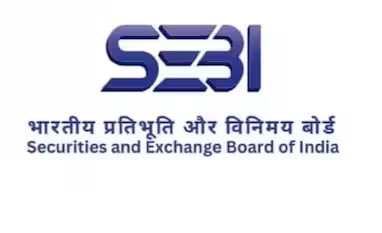

Sebi moves to restrict inflows into small- and mid-cap mutual funds
India's market regulator has asked money managers to consider restricting one-off investments from clients in small- and mid-cap stock mutual funds and cut commissions offered for their sale, two sources with direct knowledge of the matter said.The Securities and Exchange Board of India (Sebi) communicated this to the money managers in a meeting earlier this month, the sources, who included a regulatory official, said. The regulator did not specify the quantum of flows it wants restricted, they said. Sebi's communication shows heightened regulatory concern on the surging inflows into Indian small- and mid-cap mutual funds and any potential ripple effects on the financial system if investors suddenly started to yank their money from them. In India, small-cap stocks are defined as those with market capitalisation of less than Rs 5,000 crore ($603.05 million) while mid-cap stocks are those with market values of between Rs 50 crore and Rs 20,000 crore. Small- and mid-cap stocks are generally less liquid compared to their large-cap peers. Assets managed by small-cap funds in India vaulted 86.5 per centover a 10-month period to Rs 2.48 trillion ($29.92 billion) as of end-January and mid-cap funds jumped 58.5 per centto Rs 2.9 trillion . Their assets were not much lower than the Rs 2.99 trillion managed by large cap funds. The Nifty small-cap 100 index has surged 74 per centover the past 52 weeks and the Nifty mid-cap 100 index is up 60.86%, as of Wednesday's close. Those gains far exceed the benchmark Nifty's 26.21 per centrise over the same period. "A nudge to institutional investors such as mutual funds will help soothe extraordinary exuberance building up particularly in small and mid-cap stocks," the regulatory official said. Sebi did not respond to an emailed request for comment. The market regulator's communication to money managers about one-off investments is not an official order. The industry has in the past almost always complied with messages from Sebi. India's mutual fund assets have grown significantly over the years as investors have bought systematic investment plans that make regular contributions towards their portfolios. But domestic investors are also increasingly pumping in one-off, or lumpsum, funds to take advantage of the soaring stock market.


Reliance, Disney sign $8.5 bn deal to form JV, to merge media ops in India
India's top conglomerate Reliance Industries and Walt Disney on Wednesday announced the merger of their India TV and streaming media assets, creating an $8.5 billion entertainment juggernaut far ahead of rivals in the world's most populous nation. Reliance, led by Asia's richest man Mukesh Ambani, will inject $1.4 billion in the merged entity, with the company and its affiliates holding a more than 63% stake. Disney will hold about 37%, the companies said in a joint statement. For Disney, the merger follows its long-drawn struggle to arrest a user exodus from its bleeding India streaming business and financial strain caused by billions of dollars in Indian cricket rights payments, in another example how foreign businesses can struggle to grow in India. The merger values the India business of the US entertainment giant at just around a quarter of the $15 billion valuation when Disney acquired it as part of its Fox deal in 2019, sources have said. The companies said the transaction values the merged venture at around $8.5 billion on a post-money basis. They did not explain how they arrived at such valuation. Together, the Reliance-Disney merged entity will have 120 TV channels and two streaming platforms, helping Ambani eclipse rivals such as Japan's Sony, India's Zee Entertainment and Netflix in the country's $28 billion media and entertainment sector. Reliance said Nita Ambani, wife of Reliance boss Mukesh Ambani, would chair the board of the combined entity, and former top Disney executive Uday Shankar would serve as vice chair. "The JV will be one of the leading TV and digital streaming platforms for entertainment and sports content in India, bringing together iconic media assets across entertainment," the companies said in a joint statement. The deal comes when Disney is facing pressure globally to streamline its businesses. Bob Iger returned as Disney chief executive in November 2022, less than a year after he retired, and has since restructured the company to make the business more cost effective. Still, Disney is up against activist billionaire investor Nelson Peltz who is pushing the home of Mickey Mouse to cut costs, create a profitable streaming business globally, improve the performance of its movie studio, and clean up its succession planning. Iger in November said the company would like to stay in India, but it was considering its options. "Reliance has a deep understanding of the Indian market and consumer," Iger said in the statement on Wednesday, adding the deal will allow "us to better serve consumers with a broad portfolio of digital services and entertainment and sports."


Survey Says RBIs Paytm Action Won Affect Merchants Trust
Merchants' trust in the payment platform is unaffected by the severe limitations the Reserve Bank of India (RBI) placed on Paytm Payments Bank (PPBL), according to a survey done. According to Datum Intelligence, a Gurugram-based provider of business consulting and services, 59% of retailers still use Paytm and don't think the government crackdown will have an immediate effect on their business. The business conducted a survey with 2,000 business owners in 12 cities who accept payments through Paytm apps. According to a press release from Datum Intelligence, it was done between February 7 and February 15. Survey Says RBI's Paytm Action Won't Affect Merchants' Trust According to a Datum survey, 76% of retailers accept payments through Paytm. Merchants' trust in the payment platform is unaffected by the severe limitations the Reserve Bank of India (RBI) placed on Paytm Payments Bank (PPBL), according to a survey done. According to Datum Intelligence, a Gurugram-based provider of business consulting and services, 59% of retailers still use Paytm and don't think the government crackdown will have an immediate effect on their business. The business conducted a survey with 2,000 business owners in 12 cities who accept payments through Paytm apps. According to a press release from Datum Intelligence, it was done between February 7 and February 15. According to the survey, 21% of retailers are awaiting additional information The fact that a Paytm representative contacted them following the RBI ruling is what gives retailers their confidence. "After being contacted by a Paytm representative, 71% of merchants feel comfortable continuing to use Paytm for payments. According to the Datum Intelligence survey, only 11% of respondents are less confident about using Paytm for payments, and 14% of respondents are still looking for more information."Overall, the impact is limited on the merchant business and Paytm is engaging with merchants to reduce the damage and merchants are also waiting before deciding on alternatives," it added.


Vodafone Idea set for Rs 20,000 crore fundraise; shareholders nod awaited
Vodafone Idea Ltd is set to raise Rs 20,000 crore through a mix of equity and equity-linked instruments after having received the go ahead from the company's board.In an official statement filed with the exchange, the company stated, "The Board has also authorised the management to appoint various intermediaries, including bankers and counsels to execute the fund raise." To get the green light for the fundraising, the telecom company plans to hold an extraordinary general meeting with its shareholders on April 2.If shareholders give their nod, the company aims to wrap up the equity fundraising in the upcoming quarter. Alongside the fundraising, Vodafone Idea is actively working with its lenders to secure debt funding, which will complement the equity fundraising.Notably, the promoters have pledged to join in the equity raise, as previously committed, Vodafone Idea confirmed. "The equity and debt fund raising will enable the company to make investments towards significant expansion of 4G coverage, 5G network rollout and capacity expansion. These investments will enable the company to improve its competitive positioning and offer an even better customer experience," the company stated, explaining the purpose behind the fundraising. As of the end of December, Vodafone Idea's gross debt amounted to Rs 2.15 lakh crore. This includes deferred spectrum payment obligations, AGR liability due to the government, optionally convertible debentures, and dues towards banks and financial institutions. Despite its financial challenges, Vodafone Idea has been steadily growing its 4G subscriber base and average revenue per user (ARPU) for the past 10 quarters.Currently, Vodafone Idea's bank debt is relatively modest, standing at less than Rs 4,500 crore.
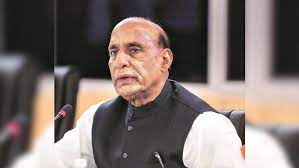

Rajnath lays down ambitious defence production target
Defence Minister Rajnath Singh, speaking at a media seminar on defence production on Saturday, laid down an annual target of Rs 3,00,000 crore in aerospace and defence services and production by 2028-29. The annual export target for aerospace and defence services and production was also raised to Rs 50,000 crore in the same time frame. "Efforts towards jointness and integration have made our military ready to deal with every challenge together," said the defence minister. "The government is focusing on long-term gains and not short-term outcomes to make India 'Viksit Bharat' (Developed India) by 2047". "The aim is to manufacture high-end systems like aero-engines and gas turbines in India in the next five years," he said.Over the preceding years, indigenous defence production growth has been based on a 2018 Ministry of Defence (MoD) roadmap titled the Defence Production Policy of 2018, or DPrP 2018. The 2018 policy set out an annual target of Rs 1,70,000 crore (then $26 billion) in aerospace and defence services and production turnover by 2025. This would be achieved through an additional investment of nearly Rs 70,000 crores (then $10 billion), creating employment for nearly 2 to 3 million people. The 2018 policy also targeted exports of defence goods and services worth Rs 35,000 crores ($5 billion) by 2025. Rajnath said no military could protect its nation with imported weaponry. He said the "government's persistent efforts" towards self-reliance have increased defence production to Rs 1 trillion. "Earlier, India was known to be an arms importer. But today, under the leadership of the prime minister, we have come out of our comfort zone and found a place in the list of ttop 25arms-exporting nations. Seven-eight years ago, defence exports did not even touch Rs 1,000 crore. Today, it has touched Rs 16,000 crore. By 2028-29, annual defence production is expected to touch Rs 3 trillion and defence exports Rs 50,000 crore," said Rajnath. This was to be achieved by creating a tiered defence industrial ecosystem in the country that would achieve self-reliance by 2025 in the development and manufacture of fighter aircraft, medium lift attack and utility helicopters, warships, land combat vehicles, missile and gun systems, small arms, ammunition and explosives, surveillance systems, electronic warfare (EW) and communications systems, night fighting enablers, submarines, unmanned aerial vehicles (UAVs) and training systems such as simulators.


RBI asks NPCI to look into One97 Communications plea to become TPAP for UPI usage
The Reserve Bank of India on Friday said it has advised the National Payments Corporation of India (NPCI) to examine the request of One97 Communications Ltd (OCL), the parent of Paytm, to become a Third-Party Application Provider (TPAP) for UPI channel for continued UPI operation of the Paytm app, as per the norms. Unified Payments Interface is an instant real-time payment system developed by NPCI to facilitate inter-bank transactions through mobile phones.It said that in case, NPCI grants TPAP status to OCL, it may be stipulated that ‘@paytm’ handles are to be migrated in a seamless manner. "In the event of NPCI granting TPAP status to OCL, it may be stipulated that ‘@paytm’ handles are to be migrated in a seamless manner from Paytm Payments Bank to a set of newly identified banks to avoid any disruption. No new users are to be added by the said TPAP until all the existing users are migrated satisfactorily to a new handle," the RBI said in a notification on Friday. A TPAP license will ensure that Paytm users can continue to make digital payments via the Unified Payments Interface (UPI). NPCI is entrusted with the supervision with the regulation and the supervision of UPI and related financial services that work on the network. PSPs need to obtain a TPAP license from NPCI to run UPI services and facilitate merchant transactions through partner banks. "For seamless migration of ‘@paytm’ handle to other banks, NPCI may facilitate certification of 4-5 banks as Payment Service Provider (PSP) Banks with demonstrated capabilities to process high volume UPI transactions. This is in line with NPCI norms for minimising concentration risk1. For the merchants using PayTM QR Codes, OCL may open the settlement accounts with one or more PSP Banks (other than Paytm Payments Bank)," the bank said. The cenytra bank further added for seamless migration of ‘@paytm’ handle to other banks, NPCI may facilitate certification of 4-5 banks as Payment Service Provider (PSP) Banks.On the other hand, 22 entities, including Amazon Pay, Google Pay, Mobikwik, PhonePe, and WhatsApp, currently have a TPAP licence.


















